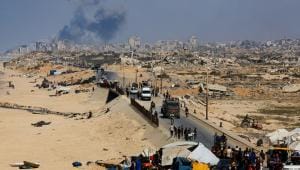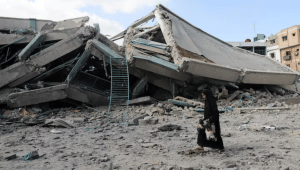Alternatives Bangladesh can explore to move away from the debt trap
Last month, at a seminar on the state of the economy, the chairman of the National Board of Revenue said that Bangladesh has "already slipped into a form of debt trap."
7 January 2026, 07:00 AM
The ‘strange fruit’ of Bhaluka and a republic in retreat
On the night of December 18, 2025, a young man was beaten to death, tied to a tree, and set ablaze by a mob in Bhaluka, Mymensingh.
24 December 2025, 02:00 AM
Can Dhaka evolve from decades of chaos and mismanagement?
Dhaka's suffocating reality stems directly from policy failures that treated urban planning as an obstacle, not a necessity.
11 December 2025, 04:00 AM
What the BBC controversy tells us about Western media bias
The recent departure of BBC bosses Tim Davie and Deborah Turness is a masterclass in unspoken power dynamics. The headlines told a story of scandal and pressure. But if you listen closely, you hear the real plot twist: the story wasn’t about their journalism; it was about whom they offended..
14 November 2025, 06:00 AM
Gaza's ‘peace’ and the unanswered questions of justice
Even as world leaders celebrate, the truce on the ground is already stained with blood.
20 October 2025, 12:00 PM
The Global South must demand more than symbolic recognition for Palestine
The UK, even as it moved to recognise Palestine, continues to arm Israel.
4 October 2025, 06:00 AM
China’s dollar-alternative ambition and what it means for Bangladesh
China’s strategy is not born of mere economic convenience but of a calculated response to geopolitical risks.
28 September 2025, 05:00 AM
Why the Global South should rewrite AI’s colonial code
By dangling open models while monopolising compute and data, Big Tech turns Global South innovators into outsourced R&D departments.
19 September 2025, 06:00 AM
Beyond the flames: Nepal’s search for a sovereign path
The Himalayas have always been a place of profound silence and deep truths.
14 September 2025, 06:00 AM
When the state fails the dead
The body of Nurul Haque was exhumed and set on fire by a mob.
12 September 2025, 05:00 AM
The Cumilla crash exposes a systemic failure
The video of a crash in Cumilla last month presents the horrifying portrait of a system in collapse.
6 September 2025, 10:04 AM
How a train to Tehran is rewriting the world’s map
The China-Iran corridor, bypassing western sea lanes, had become a steel reality.
26 August 2025, 05:00 AM
How China rewired global power at the Changsha summit
This gathering marks the forum on China-Africa Cooperation (FOCAC)’s shift from talk to the engine of South-South solidarity.
18 August 2025, 09:10 AM
How Tejgaon’s silent runway is choking Dhaka’s future
Since 2011, the CAAB has identified at least 525 illegal high-rises encroaching on approach paths at HSIA and the old Tejgaon Airport runway.
13 August 2025, 07:00 AM
Val Kilmer’s sublime chaos in ‘The Doors’ and the art of becoming Jim Morrison
The death of Val Kilmer left a void in Hollywood—a space once electrified by an actor who dared to dissolve into his roles, becoming less a performer than a vessel for the souls he channelled. Among his many transformations, none burned brighter or more dangerously than his portrayal of Jim Morrison in Oliver Stone’s 1991 psychedelic biopic “The Doors”. Kilmer didn’t just play Morrison; he haunted him, merging with the Lizard King’s Dionysian swagger, poetic brooding, and self-destructive magnetism. At the heart of this performance lies a scene that distils Morrison’s essence: his surreal, charged encounter with Andy Warhol at The Factory. Here, Kilmer’s acting transcends mimicry, offering a window into Morrison’s fractured genius and the cultural collisions of the 1960s.
13 August 2025, 05:11 AM
What led to the Milestone tragedy?
The public deserves transparency that the root causes of the crash are being addressed.
23 July 2025, 02:00 AM
The digital strip search: How America’s visa edicts redraw colonial borders in cyberspace
The irony? The US condemns China’s "social credit system" while implementing behavioural vetting via visa forms.
10 July 2025, 07:00 AM
The desert and the dream: Can the West remember how to hope?
Economic realities—stagnant wages, yawning inequality, housing crises, evaporating mobility—have fostered entrapment and diminished expectations.
30 June 2025, 11:30 AM
Why Dhaka has become unliveable
To survive Dhaka, you need a strategy. Start by embracing the absurd: treat every crisis as a plot twist.
28 June 2025, 07:00 AM
The locked archive: How bureaucracy silences Bengal’s poetic soul
The Dhanshiri still flows past the locked archive. It remembers young Jibanananda boarding steamers to Khulna, scribbling verses in the damp air.
19 June 2025, 10:30 AM




























